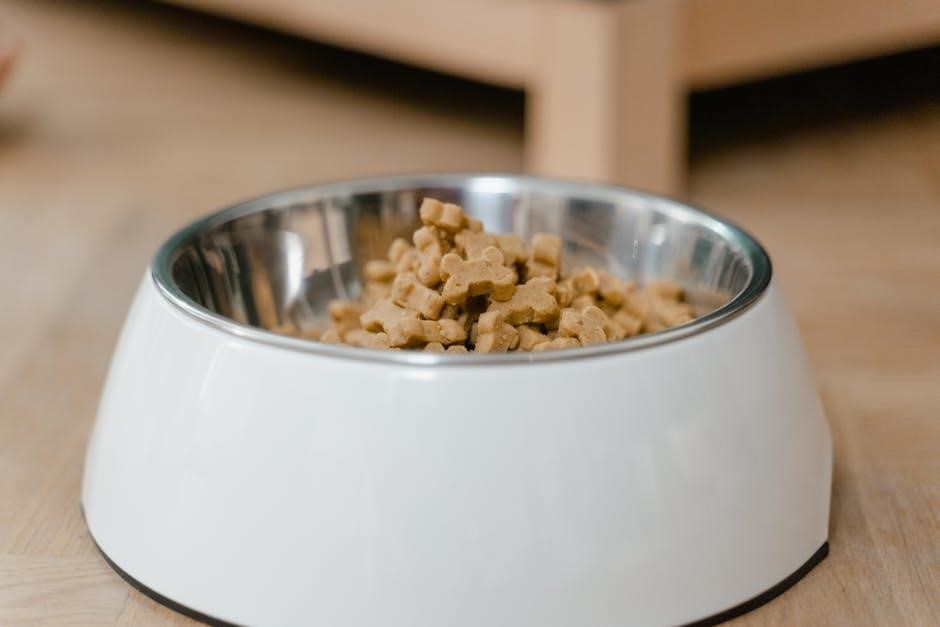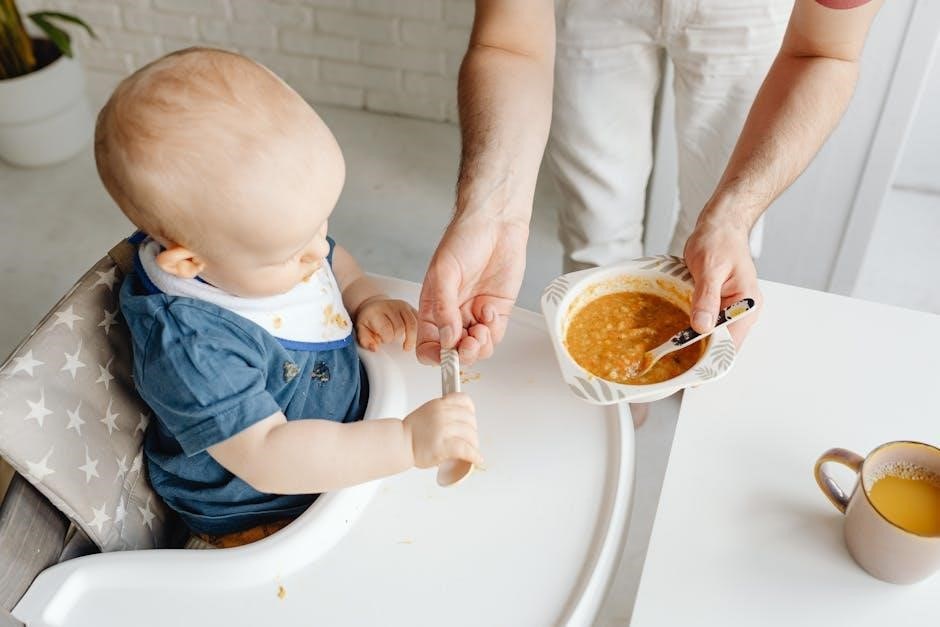Wainwrights Puppy Food offers high-quality, nutritious recipes tailored for puppies, with hypoallergenic ingredients and balanced nutrition to support healthy growth and digestion, made with natural, wholesome goodness.
1.1 Key Features of Wainwrights Puppy Food
Wainwrights Puppy Food is a high-quality, complete dry food designed to meet the nutritional needs of growing puppies. It is made with single-source proteins like chicken, salmon, or lamb, ensuring easy digestion. The recipes are hypoallergenic, making them suitable for puppies with sensitivities. Additionally, the food contains no artificial preservatives, colors, or flavors, promoting natural health. It is enriched with wholesome ingredients like brown rice and vegetables, providing essential vitamins and minerals. The kibble is designed to support healthy growth, strong immune systems, and optimal energy levels. Wainwrights Puppy Food is also free from added artificial antioxidants, ensuring a clean and natural diet for your puppy.

1.2 Benefits of Choosing Wainwrights for Your Puppy
Choosing Wainwrights Puppy Food offers numerous benefits for your puppy’s health and well-being. The high-quality, single-source proteins promote easy digestion and reduce the risk of allergies. The hypoallergenic formula is ideal for puppies with sensitive stomachs, ensuring they thrive without adverse reactions. Natural ingredients like brown rice and vegetables provide essential nutrients for healthy growth. The absence of artificial preservatives, colors, and flavors means your puppy gets a clean and wholesome diet. Additionally, Wainwrights supports strong immune systems and optimal energy levels, helping your puppy develop into a robust adult. This balanced nutrition ensures your puppy receives everything needed for a healthy start in life.

Understanding the Feeding Chart
The feeding chart provides essential guidelines for your puppy’s daily meals, based on their expected adult weight and age, ensuring balanced nutrition for healthy growth.
2.1 How to Read the Feeding Guide
Reading the feeding guide involves identifying your puppy’s age, weight, and breed to determine the recommended daily portion; The chart typically lists the puppy’s expected adult weight in kilograms, with corresponding gram amounts for each meal. For example, a puppy expected to weigh 25-32kg as an adult might need 270g of dry food per day, split into multiple meals. Small breeds (5-12kg) may require 0;5 to 1.25 trays daily, while larger breeds (25-45kg) need significantly more. Adjustments should be made based on your puppy’s growth and activity level. Always refer to the specific guidelines on the packaging for accurate feeding instructions tailored to your puppy’s needs.
2.2 Adjusting Portions Based on Puppy Size and Breed
Portion adjustments vary by puppy size and breed. Small breeds (5-12kg) require less food, typically 0.5-1.25 trays daily, while medium breeds (12-25kg) need 1.5-2.5 trays. Large breeds (25-45kg) require 4-5.5 trays. Puppies need consistent feeding schedules to avoid overfeeding; Monitor weight and adjust portions to prevent obesity. For active puppies, increase portions slightly. Consult the feeding guide for specific recommendations, ensuring optimal growth and health. Adjustments may be needed as puppies grow, so regular monitoring is essential to maintain a healthy weight and meet nutritional needs effectively.
Feeding Schedules by Puppy Age
Feeding schedules vary by age, with puppies aged 2-6 months requiring 3-4 meals daily and those aged 6-12 months needing 2-3 meals, aligning with growth stages.
3.1 Feeding Puppies Aged 2-6 Months
For puppies aged 2-6 months, Wainwrights recommends feeding 3-4 meals daily to support rapid growth and energy needs. Small breeds (5-12kg) should receive 0;5-1.25 trays or 50-100g per meal, while medium breeds (12-25kg) need 1-2 trays or 100-200g. Large breeds (25-45kg) require 1.5-3 trays or 150-300g per feeding. Portion sizes should be adjusted based on growth and activity levels. Ensure fresh water is always available. Monitor weight and adjust meals to prevent overfeeding. Wainwrights’ hypoallergenic recipes, made with natural ingredients, support digestion and overall health during this critical development phase.
3.2 Feeding Puppies Aged 6-12 Months
For puppies aged 6-12 months, feeding twice a day is typically sufficient, as growth slows down. Small breeds (5-12kg) require 0.75-1.5 trays or 75-150g per meal, medium breeds (12-25kg) need 1.25-2.5 trays or 125-250g, and large breeds (25-45kg) should have 2-4 trays or 200-400g. Adjust portions based on activity and weight. Wainwrights’ balanced recipes ensure optimal nutrition, supporting strong bones and muscles. Keep an eye on your puppy’s development and consult a vet if needed. This stage prepares them for a smooth transition to adult food, maintaining their health and vitality with high-quality ingredients.

Transitioning to Adult Food
Transition your puppy to adult food around 12-14 months. Gradually mix adult and puppy food over 7-10 days to ensure a smooth digestive transition and prevent upset.
4.1 When to Transition Your Puppy
Determine the right time to transition your puppy to adult food based on age, size, and development. Most puppies transition between 12-14 months, depending on breed. Small breeds mature faster, typically transitioning around 9-12 months, while large breeds may need up to 18 months. Monitor your puppy’s weight and physical condition to avoid overfeeding. Consult the feeding guide or a veterinarian for personalized advice. Transitioning too early or late can affect growth and health. Ensure a gradual switch to prevent digestive upset. Always follow Wainwrights’ feeding chart for specific guidance tailored to your puppy’s size and breed, ensuring a smooth and healthy transition to adulthood.
4.2 Tips for a Smooth Transition
For a seamless transition from puppy to adult food, introduce Wainwrights adult recipes gradually. Start by mixing a small portion of adult food with their current puppy food, increasing the adult food proportion daily. This helps prevent digestive upset. Divide the transition over 7-10 days, ensuring your puppy adapts well. Monitor their appetite, energy levels, and stool quality. If signs of discomfort appear, slow the process. Provide fresh water throughout to aid digestion. Follow the feeding guide on the packaging for portion sizes tailored to your puppy’s weight and breed. Consulting a vet can offer personalized advice, ensuring a healthy and stress-free transition for your growing companion.
Feeding Needs Based on Puppy Weight
Wainwrights Puppy Food tailors feeding needs by puppy weight, ensuring optimal nutrition for small, medium, and large breeds, promoting healthy growth and development.
5.1 Feeding Small Breed Puppies (5-12kg)
For small breed puppies weighing 5-12kg, Wainwrights Puppy Food recommends a tailored feeding approach to ensure proper growth and energy levels. The feeding guide suggests 0.5 to 1.25 trays per day, divided into 3-4 meals for puppies under 6 months. As they grow, the frequency can gradually reduce to 2-3 meals. High-quality ingredients like lamb, rice, and vegetables support digestion and provide essential nutrients. The hypoallergenic recipe is ideal for sensitive tummies, ensuring your small breed puppy thrives. Always follow the feeding chart on the packaging for precise portions, adjusting as needed based on your puppy’s activity and development.
5.2 Feeding Medium Breed Puppies (12-25kg)

For medium breed puppies weighing 12-25kg, Wainwrights Puppy Food provides balanced nutrition to support steady growth. The feeding guide recommends 270g of dry food per day for puppies expected to weigh 25-32kg as adults, split into 3-4 meals for those under 6 months. As they mature, meals can be reduced to 2-3 times a day. High-quality ingredients like lamb, rice, and vegetables ensure optimal digestion and energy levels. Adjust portions based on activity and growth, ensuring not to overfeed. Consult the feeding chart for precise guidance, tailored to your puppy’s specific needs and development stage.
5.3 Feeding Large Breed Puppies (25-45kg)
For large breed puppies weighing 25-45kg, Wainwrights Puppy Food recommends a daily intake of 430-470g of dry food, divided into 3-4 meals for puppies aged 2-6 months. As they mature to 6-12 months, meals can be reduced to 2-3 times a day. The food, featuring ingredients like lamb, rice, and vegetables, supports digestion and energy needs. Adjust portions based on activity levels; active puppies may require more food, while less active ones may need less. Avoid overfeeding by measuring accurately, possibly using a scale. Monitor growth and consult a vet if unsure. Combine wet and dry food cautiously to prevent overfeeding, following Wainwrights’ guidelines for balanced nutrition.
